|
|
March 16, 2020 Washington, DC
March 16-17, 2020 Washington, DC
March 19, 2020Washington, DC
April 29-May 1, 2020 |
|
|
|
|
Creating a Sustainable World in the U.S. and Abroad  Building and Measuring Community Resilience: Actions for Communities and the Gulf Research Program Building and Measuring Community Resilience: Actions for Communities and the Gulf Research Program (2019)
 Read Online Free Read Online Free Buy the Book or Download Free PDF Buy the Book or Download Free PDF
The frequency and severity of disasters over the last few decades have presented unprecedented challenges for communities across the United States. In 2005, Hurricane Katrina exposed the complexity and breadth of a deadly combination of existing community stressors, aging infrastructure, and a powerful natural hazard. In many ways, the devastation of Hurricane Katrina was a turning point for understanding and managing disasters, as well as related plan making and policy formulation. It brought the phrase "community resilience" into the lexicon of disaster management. Building and Measuring Community Resilience: Actions for Communities and the Gulf Research Program summarizes the existing portfolio of relevant or related resilience measurement efforts and notes gaps and challenges associated with them. It describes how some communities build and measure resilience and offers four key actions that communities could take to build and measure their resilience in order to address gaps identified in current community resilience measurement efforts. This report also provides recommendations to the Gulf Research Program to build and measure resilience in the Gulf of Mexico region.
(Office of Special Projects)
 Deploying Sustainable Energy During Transitions: Implications of Recovery, Renewal and Rebuilding: Proceedings of a Workshop - in Brief (2018) Deploying Sustainable Energy During Transitions: Implications of Recovery, Renewal and Rebuilding: Proceedings of a Workshop - in Brief (2018)
 Read Online Free Read Online Free Buy the Book or Download Free PDF Buy the Book or Download Free PDF
The widespread destruction of California, Houston, Puerto Rico, and the Virgin Islands from extreme events, along with continued future transition planning exercises for building and rebuilding, have increased the focus on the potential role of sustainable energy deployment. To discuss the opportunities and challenges in deploying sustainable energy during transitions, the National Academies of Sciences, Engineering, and Medicine convened a workshop in Washington, DC, on January 30, 2018. Participants explored how cities, regions, and nations are building renewable energy into their longer-term planning, in accordance with the context of the United Nations’ (UN’s) Sustainable Development Goals (SDGs). This publication summarizes the presentations and discussions from the workshop. (Science and Technology for Sustainability (STS)) The State of Resilience: A Leadership Forum and Community Workshop: Proceedings of a Workshop The State of Resilience: A Leadership Forum and Community Workshop: Proceedings of a Workshop (2018)
 Read Online Free Read Online Free Buy the Book or Download Free PDF Buy the Book or Download Free PDF
Over the past decade, resilience has gained significant traction across the nation and innovative programs are showing exciting progress in building resilient communities. For communities to be prepared for future extreme weather and climate events, as well as the chronic daily stressors, the momentum of implementing and taking action to build community resilience should continue to be fostered and expanded.
Building on its many efforts dedicated to increasing and enhancing resilience, the Resilient America Roundtable hosted the State of Resilience Leadership Forum and Community Workshop on June 28 and 29, 2016. This activity brought together diverse decision makers, experts, practitioners, and community stakeholders, including representatives from academia, government, the private sector, foundations, and nonprofit organizations, to consider the results of years of investment, experimentation, and research in building resilience, take stock of these many initiatives and efforts, and share their experiences in building more resilient communities. This publication summarizes the presentations and discussions from the workshop.(Roundtable on Risk, Resilience and Extreme Events)
 Providing Reliable and Affordable Electricity in Countries with Energy Deficits: Proceedings of a Workshop - in Brief Providing Reliable and Affordable Electricity in Countries with Energy Deficits: Proceedings of a Workshop - in Brief (2018)
 Read Online Free Read Online Free Buy the Book or Download Free PDF Buy the Book or Download Free PDF
The National Academies of Sciences, Engineering, and Medicine organized an international workshop on February 27 - March 1, 2018 to discuss increasing access to reliable and affordable electricity in energy deficit regions of the world. The workshop was meant to identify under-valued activities that are essential for major progress in expanding access to reliable and affordable electricity in energy-deficit regions, particularly in sub-Sahara Africa and southern Asia. This publication summarizes the presentations and discussions from the workshop. (Development, Security and Cooperation). Pathways to Urban Sustainability: Challenges and Opportunities for the United States Pathways to Urban Sustainability: Challenges and Opportunities for the United States (2016)
 Read Online Free Read Online Free Buy the Book or Download Free PDF Buy the Book or Download Free PDF  View report highlights (PDF) View report highlights (PDF)
 View Media Coverage View Media Coverage
Cities have experienced an unprecedented rate of growth in the last decade. More than half the world’s population lives in urban areas, with the U.S. percentage at 80 percent. Cities have captured more than 80 percent of the globe’s economic activity and offered social mobility and economic prosperity to millions by clustering creative, innovative, and educated individuals and organizations. Clustering populations, however, can compound both positive and negative conditions, with many modern urban areas experiencing growing inequality, debility, and environmental degradation. (Science and Technology for Sustainability (STS)) Transitioning Toward Sustainability Advancing the Scientific Foundation: Proceedings of a Workshop (July 2016) Transitioning Toward Sustainability Advancing the Scientific Foundation: Proceedings of a Workshop (July 2016)
 Read Online Free Read Online Free Buy the Book or Download Free PDF Buy the Book or Download Free PDF
In 1999 the National Academies of Sciences, Engineering, and Medicine released a landmark report, Our Common Journey: A Transition toward Sustainability, which attempted to “reinvigorate the essential strategic connections between scientific research, technological development, and societies’ efforts to achieve environmentally sustainable improvements in human well-being.”1 The report emphasized the need for place-based and systems approaches to sustainability, proposed a research strategy for using scientific and technical knowledge to better inform the field, and highlighted a number of priorities for actions that could contribute to a sustainable future. (Science and Technology for Sustainability (STS))  Integrating Landscape Approaches and Multi-Resource Analysis into Natural Resource Management: Summary of a Workshop (Prepublication, February 2016) Integrating Landscape Approaches and Multi-Resource Analysis into Natural Resource Management: Summary of a Workshop (Prepublication, February 2016)
 Read Online Free Read Online Free Buy the Book or Download Free PDF Buy the Book or Download Free PDF
The responsible management of natural resources for present-day needs and future generations requires integrated approaches that are place-based, embrace systems thinking, and incorporate the social, economic, and environmental considerations of sustainability. Landscape-scale analysis takes this holistic view by focusing on the spatial scales most appropriate for the resource types and values being managed. Landscape-scale analysis involves assessing landscape features in relation to a group of influencing factors such as land use change, hydrologic changes or other disturbances, topography, and historical vegetation conditions. (Science and Technology for Sustainability (STS))
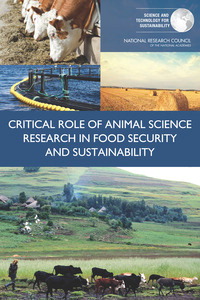 Critical Role of Animal Science Research in Food Security and Sustainability (2015) Critical Role of Animal Science Research in Food Security and Sustainability (2015)
 Read Online Free Read Online Free Buy the Book or Download Free PDF Buy the Book or Download Free PDF  View report highlights (PDF) View report highlights (PDF)
 Watch related video Watch related video  View Media Coverage View Media Coverage
This report identifies areas of research and development, technology, and resource needs for research in the field of animal agriculture, both nationally and internationally. This report assesses the global demand for products of animal origin in 2050 within the framework of ensuring global food security; evaluates how climate change and natural resource constraints may impact the ability to meet future global demand for animal products in sustainable production systems; and identifies factors that may impact the ability of the United States to meet demand for animal products, including the need for trained human capital, product safety and quality, and effective communication and adoption of new knowledge, information, and technologies. (Science and Technology for Sustainability (STS))
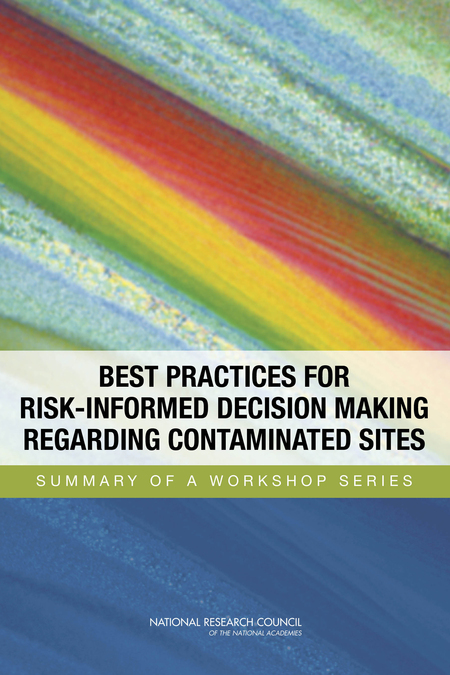 Best Practices for Risk-Informed Decision Making Regarding Contaminated Sites: Summary of a Workshop Series (July 2014) Best Practices for Risk-Informed Decision Making Regarding Contaminated Sites: Summary of a Workshop Series (July 2014)
 Read Online Free Read Online Free  Buy the Book or Download Free PDF Buy the Book or Download Free PDF
This report is the summary of two workshops convened in October 2013 and January 2014 on best practices for risk-informed remedy selection, closure, and post-closure control of radioactive and chemically contaminated sites that present significant difficulty for remediation to unrestricted release. The workshop series aimed to explore best practices that promote effective, risk-informed decision making and future opportunities to improve remediation approaches and practices.In the Workshop #1 section of Best Practices for Risk-Informed Decision Making Regarding Contaminated Sites, the report examines holistic approaches for remediating sites with multiple contaminant sources and post-closure uses, and approaches for incorporating a sustainability framework into decision making regarding site remediation, closure, and post-closure control. In Workshop #2, the report focuses on post-closure controls, assessment of long-term performance of site remedies, and best practices for risk-based remediation decisions. (Science and Technology for Sustainability (STS))
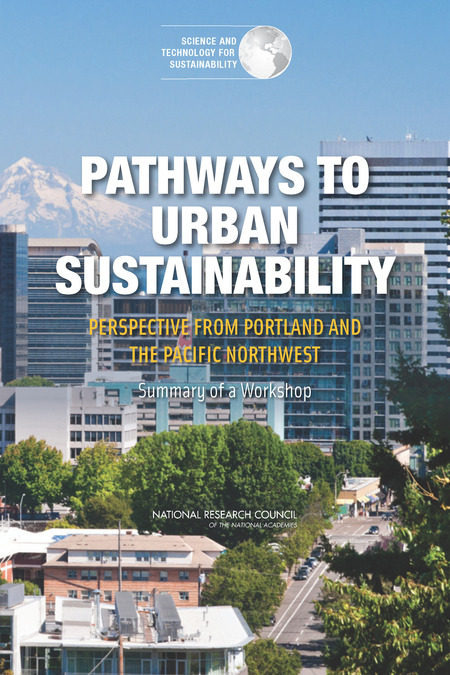 Pathways to Urban Sustainability: Perspective from Portland and the Pacific Northwest: Summary of a Workshop (March 2014) Pathways to Urban Sustainability: Perspective from Portland and the Pacific Northwest: Summary of a Workshop (March 2014)
 Read Online Free Read Online Free  Buy the Book or Download Free PDF Buy the Book or Download Free PDF
For more than 40 years, the Portland Metropolitan Region has been a national leader in urban policies and investments intended to revitalize the central city and adjacent neighborhoods, preserve the environment, improve equity, and make the city more economically competitive and livable. Among the elements contributing to Portland’s success have been strong public-private partnerships, a culture of planning, and a willingness to implement diverse ideas generated by federal, state, and local agencies, academics, and the private sector. This report summarizes a 2013 workshop that examined issues related to sustainability in the Portland metropolitan and greater Pacific Northwest regions. Presentations and discussions explored the role of land use restrictions on development, transportation innovations, and economic and social challenges, among other subjects. The workshop was the third in a series of place-based workshops on urban sustainability, preceded by events in Atlanta and Houston. ( Science and Technology for Sustainability (STS)) 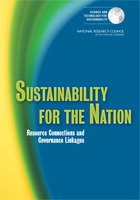 Sustainability for the Nation: Resource Connection and Governance Linkages (June 2013) Sustainability for the Nation: Resource Connection and Governance Linkages (June 2013)
 Read Online Free Read Online Free  Buy the Book or Download Free PDF Buy the Book or Download Free PDF
 View Media Coverage View Media Coverage
A "sustainable society," according to one definition, "is one that can persist over generations; one that is far-seeing enough, flexible enough, and wise enough not to undermine either its physical or its social system of support." As the government sector works hard to ensure sufficient fresh water, food, energy, housing, health, and education for the nation without limiting resources for the future generations, it's clear that there is no sufficient organization to deal with sustainability issues. Each federal agency appears to have a single mandate or a single area of expertise making it difficult to tackle issues such as managing the ecosystem. Key resource domains, which include water, land, energy, and nonrenewable resources, for example, are nearly-completely connected yet different agencies exist to address only one aspect of these domains.
The legendary ecologist John Muir wrote in 1911 that "when we try to pick out anything by itself, we find it hitched to everything else in the Universe." Thus, in order for the nation to be successful in sustaining its resources, "linkages" will need to be built among federal, state, and local governments; nongovernmental organizations (NGOs); and the private sector. The National Research Council (NRC) was asked by several federal agencies, foundations, and the private sector to provide guidance to the federal government on issues related to sustainability linkages. The NRC assigned the task to as committee with a wide range of expertise in government, academia, and business. The committee held public fact-finding meetings to hear from agencies and stakeholder groups; examined sustainability management examples; conducted extensive literature reviews; and more to address the issue. Sustainability for the Nation: Resource Connection and Governance Linkages is the committee's report on the issue.
The report includes insight into high-priority areas for governance linkages, the challenges of managing connected systems, impediments to successful government linkages, and more. The report also features examples of government linkages which include Adaptive Management on the Platte River, Philadelphia's Green Stormwater Infrastructure, and Managing Land Use in the Mojave. ( Science and Technology for Sustainability (STS))  Pathways to Urban Sustainability: A Focus on the Houston Metropolitan Region: Summary of a Workshop (January 2013) Pathways to Urban Sustainability: A Focus on the Houston Metropolitan Region: Summary of a Workshop (January 2013)
 Read Online Free Read Online Free  Buy the Book or Download Free PDF Buy the Book or Download Free PDF
The workshop was convened to explore the region's approach to urban sustainability, with an emphasis on building the evidence base upon which new policies and programs might be developed. Participants examined how the interaction of various systems (natural and human systems; energy, water, and transportation systems) affected the region's social, economic, and environmental conditions. The objectives of the workshop were as follows:
- Discuss ways that regional actors are approaching sustainability— specifically, how they are attempting to merge environmental, social, and economic objectives.
- Share information about ongoing activities and strategic planning efforts, including lessons learned.
- Examine the role that science, technology, and research can play in supporting efforts to make the region more sustainable.
- Explore how federal agency efforts, particularly interagency partnerships, can complement or leverage the efforts of other key stakeholders.
Pathways to Urban Sustainability: A Focus on the Houston Metropolitan Region: Summary of a Workshop was designed to explore the complex challenges facing sustainability efforts in the Houston metropolitan region and innovative approaches to addressing them, as well as performance measures to gauge success and opportunities to link knowledge with action. In developing the agenda, the planning committee chose topics that were timely and cut across the concerns of individual institutions, reflecting the interests of a variety of stakeholders. Panelists were encouraged to share their perspectives on a given topic; however, each panel was designed to provoke discussion that took advantage of the broad experience of the participants. ( Science and Technology for Sustainability (STS)) 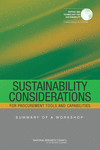 Sustainability Considerations for Procurement Tools and Capabilities: Summary of a Workshop (September 2012) Sustainability Considerations for Procurement Tools and Capabilities: Summary of a Workshop (September 2012)
 Read Online Free Read Online Free  Buy the Book or Download Free PDF Buy the Book or Download Free PDF  View report highlights (PDF) View report highlights (PDF)
 Watch related video Watch related video
Federal laws, regulations, and executive orders have imposed requirements for federal agencies to move toward the sustainable acquisition of goods and services, including the incorporation of sustainable purchasing into federal agency decision making. Since the federal government is such a significant player in the market, its move to incorporate sustainable procurement practices could have a profound impact on the types of products being developed for the market as a whole. The General Services Administration (GSA) has played a key role in furthering sustainable procurement practices throughout the federal government. GSA is responsible for formulating and maintaining government-wide policies covering a variety of administrative actions, including those related to procurement and management. GSA has several ongoing activities related to sustainable procurement to assess the feasibility of working with the federal supplier community - vendors and contractors that serve federal agencies to measure and reduce greenhouse gas emissions in the supply chain while encouraging sustainable operations among suppliers. GSA has also been actively developing programs to assist federal agencies in making sustainable procurement decisions. As federal agencies cannot directly fund the development of sustainable procurement tools, they are particularly interested in understanding how to foster innovation and provide incentives for collaboration between developers and users of tools for sustainable purchasing throughout the supply chain. The training of procurement professionals is also a priority for these agencies. To assist efforts to build sustainability considerations into the procurement process, the National Research Council appointed a committee to organize a two-day workshop that explored ways to better incorporate sustainability considerations into procurement tools and capabilities across the public and private sectors. The workshop was designed to help participants assess the current landscape of green purchasing tools, identify emerging needs for enhanced or new tools and opportunities to develop them, identify potential barriers to progress, and explore potential solutions. The workshop provided an opportunity for participants to discuss challenges related to sustainable purchasing and to developing new procurement tools. Sustainability Considerations for Procurement Tools and Capabilities reviews the presenters' recommendations and tools currently used in sustainable procurement, such as databases for ecolabels and standards, codes, or regulations and other nontechnological tools such as policies, frameworks, rating systems, and product indexes. ( Science and Technology for Sustainability (STS))
The National Research Council's Science and Technology for Sustainability Program hosted two workshops in 2011 addressing the sustainability challenges associated with food security for all. The first workshop, Measuring Food Insecurity and Assessing the Sustainability of Global Food Systems, explored the availability and quality of commonly used indicators for food security and malnutrition; poverty; and natural resources and agricultural productivity. It was organized around the three broad dimensions of sustainable food security: (1) availability, (2) access, and (3) utilization. The workshop reviewed the existing data to encourage action and identify knowledge gaps. The second workshop, Exploring Sustainable Solutions for Increasing Global Food Supplies, focused specifically on assuring the availability of adequate food supplies. How can food production be increased to meet the needs of a population expected to reach over 9 billion by 2050? Workshop objectives included identifying the major challenges and opportunities associated with achieving sustainable food security and identifying needed policy, science, and governance interventions. Workshop participants discussed long term natural resource constraints, specifically water, land and forests, soils, biodiversity and fisheries. They also examined the role of knowledge, technology, modern production practices, and infrastructure in supporting expanded agricultural production and the significant risks to future productivity posed by climate change. This is a report of two workshops. ( Science and Technology for Sustainability (STS)) The two hundredth anniversary of the birth of Charles Darwin, February 12, 2009, occurred at a critical time for the United States and the world. In honor of Darwin's birthday, the National Research Council appointed a committee under the auspices of the U.S. National Committee (USNC) for DIVERSITAS to plan a Symposium on Twenty-first Century Ecosystems. The purpose of the symposium was to capture some of the current excitement and recent progress in scientific understanding of ecosystems, from the microbial to the global level, while also highlighting how improved understanding can be applied to important policy issues that have broad biodiversity and ecosystem effects. The aim was to help inform new policy approaches that could satisfy human needs while also maintaining the integrity of the goods and services provided by biodiversity and ecosystems over both the short and the long terms.
This report summarizes the views expressed by symposium participants; however, it does not provide a session-by-session summary of the presentations at the symposium. Instead, the symposium steering committee identified eight key themes that emerged from the lectures, which were addressed in different contexts by different speakers. The focus here is on general principles rather than specifics. These eight themes provide a sharp focus on a few concepts that enable scientists, environmental NGOs, and policy makers to engage more effectively around issues of central importance for biodiversity and ecosystem management. (Board on International Scientific Organizations (BISO))
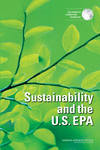 Sustainability and the U.S. EPA (September 2011) Sustainability and the U.S. EPA (September 2011) Read Online Free Read Online Free  Buy the Book or Download the Free PDF Buy the Book or Download the Free PDF  Watch related video Watch related video  View media coverage View media coverage
This framework, Sustainability and the U.S. EPA, provides recommendations for a sustainability approach that both incorporates and goes beyond an approach based on assessing and managing the risks posed by pollutants that has largely shaped environmental policy since the 1980s. Although risk-based methods have led to many successes and remain important tools, the report concludes that they are not adequate to address many of the complex problems that put current and future generations at risk, such as depletion of natural resources, climate change, and loss of biodiversity. Moreover, sophisticated tools are increasingly available to address cross-cutting, complex, and challenging issues that go beyond risk management.The report recommends that EPA formally adopt as its sustainability paradigm the widely used "three pillars" approach, which means considering the environmental, social, and economic impacts of an action or decision. Health should be expressly included in the "social" pillar. EPA should also articulate its vision for sustainability and develop a set of sustainability principles that would underlie all agency policies and programs. ( Science and Technology for Sustainability (STS)) 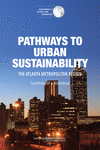 Pathways to Urban Sustainability: Lessons from the Atlanta Metropolitan Region: Summary of a Workshop (June 2011) Pathways to Urban Sustainability: Lessons from the Atlanta Metropolitan Region: Summary of a Workshop (June 2011)
 Read Online Free Read Online Free  Buy the Book or Download the Free PDF Buy the Book or Download the Free PDF
The U.S. population is more than 80 percent urban. Recognizing that many metropolitan areas in the United States have been experimenting with various approaches to sustainability, and that despite the differences among regions, there are likely some core similarities and transferable knowledge, Roundtable members selected the metropolitan Atlanta, Georgia region as a case study. The Atlanta region provided a compelling example for exploring urban sustainability issues because of the region's rapid growth rate, well-documented challenges with water, land use, and transportation; and its level of engagement with federal government agencies on matters related to sustainability. Pathways to Urban Sustainability: Lessons from the Atlanta Metropolitan Region: Summary of a Workshop explores the Atlanta region's approach to urban sustainability, with an emphasis on building evidence based foundation upon which policies and programs might be developed. The two day workshop held on September 30 and October 1, 2010 examined how the interaction of various systems (natural and human systems; energy, water and transportations systems) affect the region's social, economic, and environmental conditions. The intent of this workshop summary is to analyze a metropolitan region so that researchers and practitioners can improve their understanding of the spatial and temporal aspects of urban sustainability. (Science and Technology for Sustainability (STS))
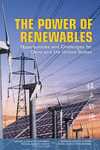 The Power of Renewables: Opportunities and Challenges for China and the United States (December 2010) The Power of Renewables: Opportunities and Challenges for China and the United States (December 2010)
 Read Online Free Read Online Free  Buy the Book or Download the Free PDF Buy the Book or Download the Free PDF
The United States and China are the world's top two energy consumers and, as of 2010, the two largest economies. Consequently, they have a decisive role to play in the world's clean energy future. Both countries are also motivated by related goals, namely diversified energy portfolios, job creation, energy security, and pollution reduction, making renewable energy development an important strategy with wide-ranging implications. Given the size of their energy markets, any substantial progress the two countries make in advancing use of renewable energy will provide global benefits, in terms of enhanced technological understanding, reduced costs through expanded deployment, and reduced greenhouse gas (GHG) emissions relative to conventional generation from fossil fuels.
Within this context, the U.S. National Academies, in collaboration with the Chinese Academy of Sciences (CAS) and Chinese Academy of Engineering (CAE), reviewed renewable energy development and deployment in the two countries, to highlight prospects for collaboration across the research to deployment chain and to suggest strategies which would promote more rapid and economical attainment of renewable energy goals.
Main findings and concerning renewable resource assessments, technology development, environmental impacts, market infrastructure, among others, are presented. Specific recommendations have been limited to those judged to be most likely to accelerate the pace of deployment, increase cost-competitiveness, or shape the future market for renewable energy. The recommendations presented here are also pragmatic and achievable. (Development, Security, and Cooperation (DSC) / National Academy of Engineering (NAE))
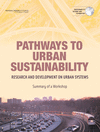 Pathways to Urban Sustainability: Research and Development on Urban Systems (September 2010) Pathways to Urban Sustainability: Research and Development on Urban Systems (September 2010)
 Read Online Free Read Online Free  Buy the Book or Download the Free PDF Buy the Book or Download the Free PDF
More than half of the world's people now live in cities. In the United States, the figure is 80 percent. It is worthwhile to consider how this trend of increased urbanization, if inevitable, could be made more sustainable. One fundamental shortcoming of urban research and programs is that they sometimes fail to recognize urban areas as systems. Current institutions and actors are not accustomed to exploring human-environment interactions, particularly at an urban-scale. The fact is that these issues involve complex interactions, many of which are not yet fully understood. Thus a key challenge for the 21st century is this: How can we develop sustainable urban systems that provide healthy, safe and affordable environments for the growing number of Americans living in cities and their surrounding metropolitan areas?
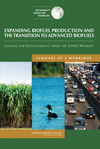 Expanding Biofuel Production: Sustainability and the Transition to Advanced Biofuels: Summary of a Workshop (April 2010) Expanding Biofuel Production: Sustainability and the Transition to Advanced Biofuels: Summary of a Workshop (April 2010)
 Read Online Free Read Online Free  Buy the Book or Download the Free PDF Buy the Book or Download the Free PDF
While energy prices, energy security, and climate change are front and center in the national media, these issues are often framed to the exclusion of the broader issue of sustainability--ensuring that the production and use of biofuels do not compromise the needs of future generations by recognizing the need to protect life-support systems, promote economic growth, and improve societal welfare. Thus, it is important to understand the effects of biofuel production and use on water quality and quantity, soils, wildlife habitat and biodiversity, greenhouse gas emissions, air quality, public health, and the economic viability of rural communities. (Science and Technology for Sustainability (STS) / Policy and Global Affairs)
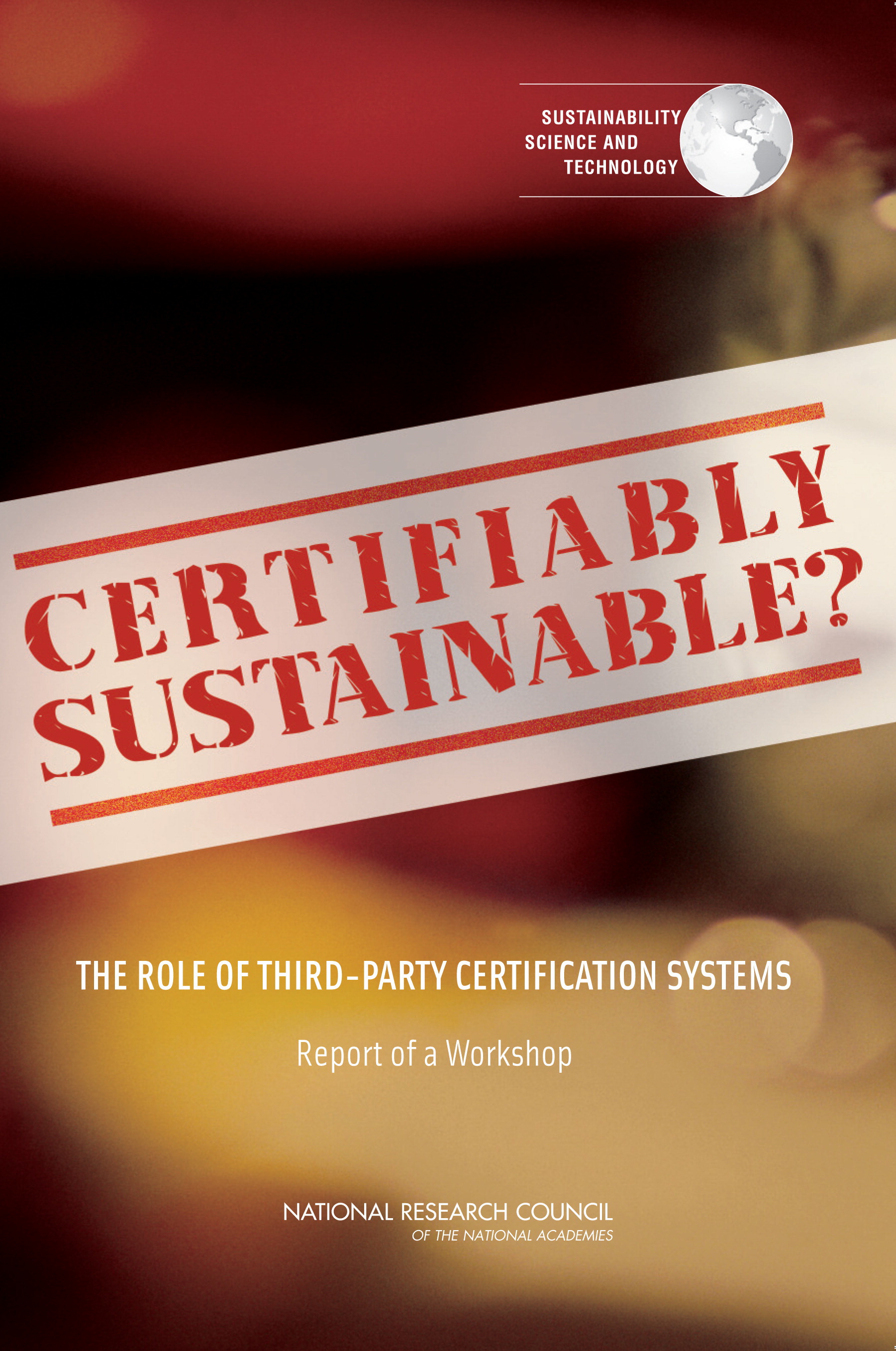 Certifiably Sustainable?: The Role of Third-Party Certification Systems: Report of a Workshop (July 2010) Certifiably Sustainable?: The Role of Third-Party Certification Systems: Report of a Workshop (July 2010)
 Read Online Free Read Online Free  Buy the Book or Download the Free PDF Buy the Book or Download the Free PDF
Consumption of goods and services represents a growing share of global economic activity, bringing with it negative consequences for the environment and human well-being and presenting major challenges in the transition to sustainability. Third-party certification systems have emerged over the last 15 years as a sustainability tool with some promise. There has been anecdotal evidence of success with these systems, but to date the overall impact of certified goods and services has been small. Moreover, definitions of what is sustainable vary across sectors and markets, and rigorous assessments of these programs have been rare. In January 2009 the Science and Technology for Sustainability Program held a workshop to illuminate the decision making process of those who purchase and produce certified goods and services. The workshop, summarized in this volume, involved presentations and discussions with approximately 40 invited experts from academia, business, government, and nongovernmental organizations, and helped clarify the scope and limitations of the scientific knowledge that might contribute to the economic success of certified products. (Science and Technology for Sustainability Program (STS))
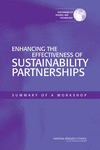 Enhancing the Effectiveness of Sustainability Enhancing the Effectiveness of Sustainability
Partnerships: Summary of a Workshop (December 2009)
 Read online free Read online free  Buy the book or Download the Free PDF Buy the book or Download the Free PDF
Sustainable development--meeting human needs while nurturing and restoring the planet's life support systems--requires a continuous process of scientific innovation, new knowledge and learning, and collaborative approaches to implementing technologies and policies. To address these challenges, different stakeholder groups are increasingly seeking to ally themselves through partnership, in order to implement projects, deliver services, establish secure funding mechanisms, and achieve on the ground results. Advocates of this collaborative approach point to the failure of governmental regulations, international commitments, or business as usual. However, skeptics often question the effectiveness of partnerships at achieving sustainable development goals and, in the absence of demonstrated results, wonder where partnerships are adding value. A symposium held in June 2008 and summarized in this volume, attempted to advance the dialogue on partnerships for sustainability in order to catalyze existing knowledge and inform future efforts. Ideas that came out of discussions at the symposium will help leaders in government, the private sector, foundations and NGOs, and universities, both in the United States and internationally, as they develop and participate in new partnerships for sustainability. (Policy and Global Affairs (PGA))
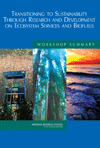 Transitioning to Sustainability Through Research and Development on Ecosystem Services and Biofuels: Workshop Summary (2008) Transitioning to Sustainability Through Research and Development on Ecosystem Services and Biofuels: Workshop Summary (2008)
 Read online free Read online free  Buy the book or Download the Free PDF Buy the book or Download the Free PDF  Download the report brief (PDF) Download the report brief (PDF)
In October 2007 the Roundtable on Science and Technology for Sustainability hosted its first forum on federal sustainability research and development, focused on ecosystem services and biofuels. Participants discussed opportunities for collaboration across agencies, research gaps, and needed analytical tools. While focused primarily on federal activities, the forum also considered initiatives from universities, the private sector, and international organizations. The workshop fostered inter-agency relationships leading to both formal and informal collaboration on future federal research and development projects. Another offshoot of workshop conversations was the formation of the Network for Emerging Leaders in Sustainability (NELS)—a networking group that encourages professionals in the sustainability field to explore opportunities with peers in DC-area agencies and organizations. (Science and Technology for Sustainability Program (STS))
Originally announced at the 2002 World Summit on Sustainable Development, the Academies organized a series of workshops to encourage decision makers to use science to inform their decisions and to encourage scientists to consider the needs of decision makers in their choice of research. The workshops focused on implementation of the Stockholm Convention on Persistent Organic Pollutants--POPs (China); Management of Groundwater (Mexico); and Agricultural Water Management (Tunisia). The workshops resulted in a strengthened dialogue in the host countries among government policy makers, the scientific community, and others. In Mexico a Center for Water Studies was started in Cancun with strong support from the Water Network of the Mexican Academy of Sciences. Scientists from the Chinese Academy of Sciences participated in the formulation of the Chinese National Implementation Plan for the Stockholm Convention and have been involved in providing policy analysis, studying alternative technology development, and conducting field investigations on POPs.
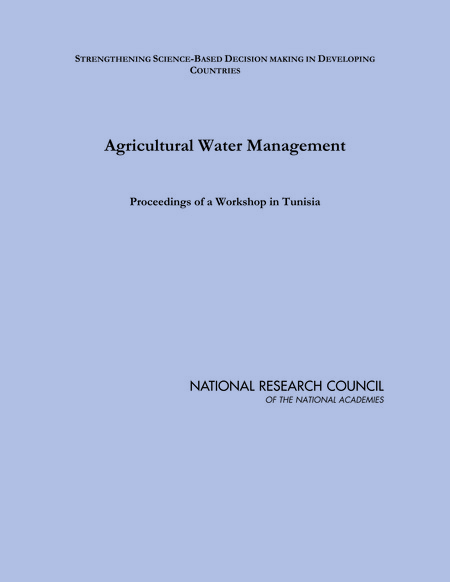 Agricultural Water Management: Proceedings of a Workshop in Tunisia (Series: Strengthening Science-Based Decision Making in Developing Countries) (2007) Agricultural Water Management: Proceedings of a Workshop in Tunisia (Series: Strengthening Science-Based Decision Making in Developing Countries) (2007)
 Read online free Read online free  Buy the book or Download the Free PDF Buy the book or Download the Free PDF
This report contains a collection of papers from a workshop---Strengthening Science-Based Decision-Making for Sustainable Management of Scarce Water Resources for Agricultural Production, held in Tunisia. Participants, including scientists, decision makers, representatives of non-profit organizations, and a farmer, came from the United States and several countries in North Africa and the Middle East. The papers examined constraints to agricultural production as it relates to water scarcity; focusing on 1) the state of the science regarding water management for agricultural purposes in the Middle East and North Africa 2) how science can be applied to better manage existing water supplies to optimize the domestic production of food and fiber. The cross-cutting themes of the workshop were the elements or principles of science-based decision making, the role of the scientific community in ensuring that science is an integral part of the decision making process, and ways to improve communications between scientists and decision makers. (Science and Technology for Sustainability Program (STS))
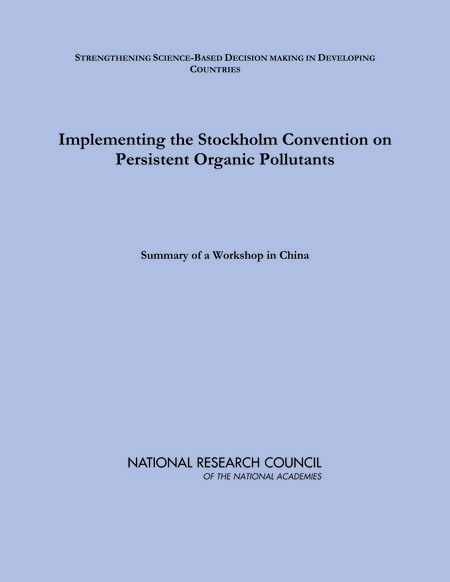 Implementing the Stockholm Convention on Persistent Organic Pollutants: Summary of a Workshop in China (Series: Strengthening Science-Based Decision Making in Developing Countries) (2007) Implementing the Stockholm Convention on Persistent Organic Pollutants: Summary of a Workshop in China (Series: Strengthening Science-Based Decision Making in Developing Countries) (2007)
 Read online free Read online free  Buy the book or Download the Free PDF Buy the book or Download the Free PDF
This report summarizes a workshop --- Strengthening Science-Based Decision-Making: Implementing the Stockholm Convention on Persistent Organic Pollutants held June 7-10, 2004, in Beijing, China. The presentations and discussions summarized here describe the types of scientific information necessary to make informed decisions to eliminate the production and use of Persistent Organic Pollutants (POPs) banned under the Stockholm Convention, sources of information; scientifically informed strategies for eliminating POPs, elements of good scientific advice, such as transparency, peer review, and disclosure of conflicts of interest; and information dealing with POPs that decision makers need from the scientific community, including next steps to make such science available and ensure its use on a continuing basis. (Science and Technology for Sustainability Program (STS))
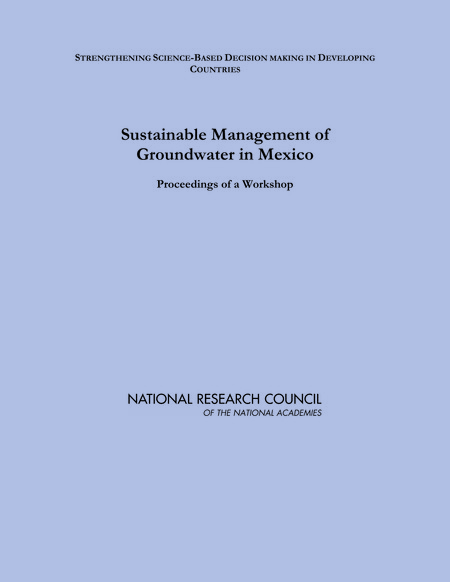 Sustainable Management of Groundwater in Mexico: Proceedings of a Workshop (Series: Strengthening Science-Based Decision Making in Developing Countries) Sustainable Management of Groundwater in Mexico: Proceedings of a Workshop (Series: Strengthening Science-Based Decision Making in Developing Countries) (2007)  Read online free Read online free  Buy the book or Download the Free PDF Buy the book or Download the Free PDF
This report contains a collection of papers presented at a workshop in Merida, Mexico --- Strengthening Science-Based Decision Making: Sustainable Management of Groundwater in Mexico. The cross-cutting themes of the workshop were the elements or principles of science-based decision making and the role of the scientific community in ensuring that science is an integral part of the decision making process. Papers included in this volume describe the groundwater resources of Mexico’s Yucatan Peninsula, approaches to managing groundwater in Mexico and governmental and scientific institutions concerned with water resources. Other papers discuss US approaches to managing scarce water resources. Participants in the workshop included representatives from leading scientific and academic institutions, federal state and local governments, non-governmental organizations and businesses. ( Science and Technology for Sustainability Program (STS))
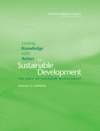 Linking Knowledge with Action for Sustainable Development: The Role of Program Management - Summary of a Workshop Linking Knowledge with Action for Sustainable Development: The Role of Program Management - Summary of a Workshop (2006)  Read Online Free Read Online Free  Buy the Book or Download the Free PDF Buy the Book or Download the Free PDF
This report summarizes a workshop organized by the National Academies’ Roundtable on Science and Technology for Sustainability. The workshop brought together a select group of program managers from the public and private sectors to discuss specific cases of linking knowledge to action in a diverse set of integrated observation, assessment, and decision support systems. Workshop discussions explored a wide variety of experiments in harnessing science and technology to goals of promoting development and conserving the environment. Participants reflected on the most significant challenges that they have faced when trying to implement their programs and the strategies that they have used to address them successfully. The report summarizes discussions at the workshop, including common themes about the process of linking knowledge with actions for sustainable development that emerged across a wide range of cases, sectors, and regions. ( Science and Technology for Sustainability (STS))
|
|












 Sustainability for the Nation: Resource Connection and Governance Linkages
Sustainability for the Nation: Resource Connection and Governance Linkages
 Sustainability Considerations for Procurement Tools and Capabilities: Summary of a Workshop
Sustainability Considerations for Procurement Tools and Capabilities: Summary of a Workshop 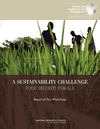
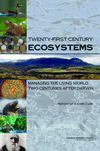
 Sustainability and the U.S. EPA (September 2011)
Sustainability and the U.S. EPA (September 2011) Pathways to Urban Sustainability: Lessons from the Atlanta Metropolitan Region: Summary of a Workshop (June 2011)
Pathways to Urban Sustainability: Lessons from the Atlanta Metropolitan Region: Summary of a Workshop (June 2011) The Power of Renewables: Opportunities and Challenges for China and the United States (December 2010)
The Power of Renewables: Opportunities and Challenges for China and the United States (December 2010)
 Expanding Biofuel Production: Sustainability and the Transition to Advanced Biofuels: Summary of a Workshop (April 2010)
Expanding Biofuel Production: Sustainability and the Transition to Advanced Biofuels: Summary of a Workshop (April 2010)
 Enhancing the Effectiveness of Sustainability
Enhancing the Effectiveness of Sustainability  Transitioning to Sustainability Through Research and Development on Ecosystem Services and Biofuels: Workshop Summary (2008)
Transitioning to Sustainability Through Research and Development on Ecosystem Services and Biofuels: Workshop Summary (2008)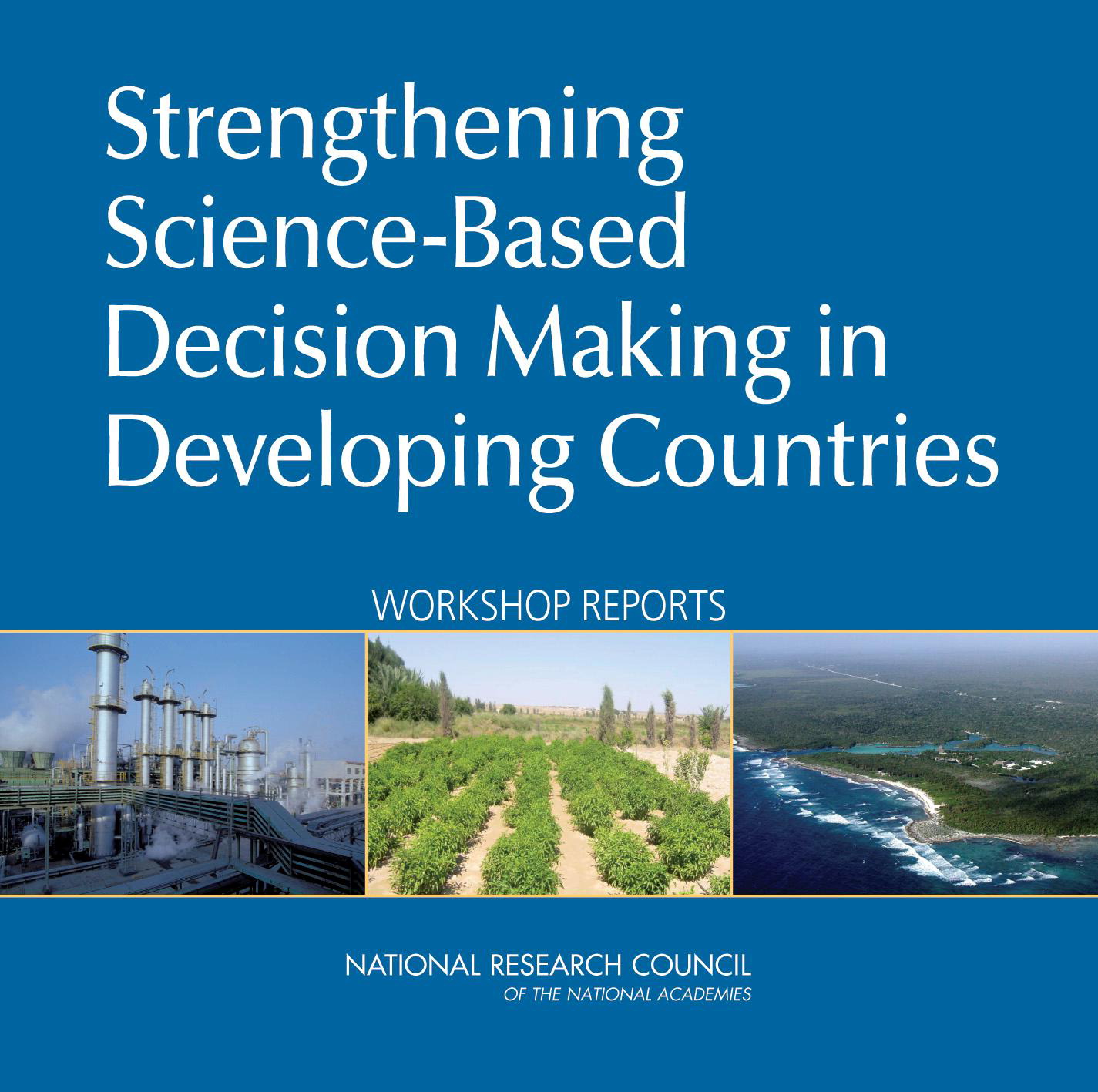
 Agricultural Water Management: Proceedings of a Workshop in Tunisia (Series: Strengthening Science-Based Decision Making in Developing Countries) (2007)
Agricultural Water Management: Proceedings of a Workshop in Tunisia (Series: Strengthening Science-Based Decision Making in Developing Countries) (2007) Implementing the Stockholm Convention on Persistent Organic Pollutants: Summary of a Workshop in China (Series: Strengthening Science-Based Decision Making in Developing Countries) (2007)
Implementing the Stockholm Convention on Persistent Organic Pollutants: Summary of a Workshop in China (Series: Strengthening Science-Based Decision Making in Developing Countries) (2007) Sustainable Management of Groundwater in Mexico: Proceedings of a Workshop (Series: Strengthening Science-Based Decision Making in Developing Countries) (2007)
Sustainable Management of Groundwater in Mexico: Proceedings of a Workshop (Series: Strengthening Science-Based Decision Making in Developing Countries) (2007)